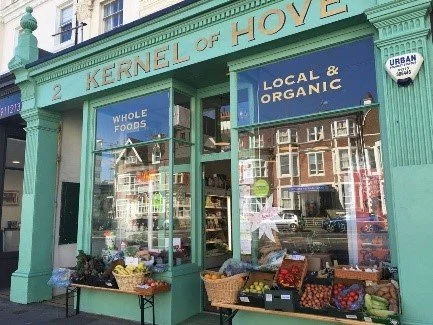Regenerative Food Systems Thinking
In spite of the truly marvellous inventiveness of the human brain, we are beginning to wonder whether our power to change the face of nature should not have been tempered with wisdom for our own good, and with a greater sense of responsibility for the welfare of generations to come.
- Rachel Carson, 1963
In the long shadow cast by the Coronavirus pandemic that is not quite behind us, it has become starkly evident that the fragility of the global industrial food system needs urgent transformation. In the UK, industries, cities and communities are on high alert, navigating through shifting currents of post-Brexit, post-pandemic recovery plans and changing policies that will impact on food, farming and the health of people and planet, in ways which we cannot yet know. The pandemic of deep questioning not only highlighted the vulnerability and toxicity of the global food system, but crucially raised awareness of the strategic importance of local, regenerative food systems in addressing health, climate change and ecosystem collapse.
The pandemic saw more UK residents than ever turning to local farms, veg boxes or their own gardens and allotments to source their food. (Howard, 2020) In Brighton and elsewhere, many discovered what a valuable resource their local independent food shops were – for practical and social exchanges at a time of lockdown — as supermarket shelves emptied out and lorries stood still behind obstinate closed borders. Headlines warned that Britain could run out of food in four days. More panic, more emptying of indifferent supermarket shelves. Just under half of the actual food on our plates is produced in the UK (United Kingdom Food Security Report 2021) and, as evidenced by supermarket overwhelm, where food is grown is often not where it is consumed. Enslaved to fossil fuel extraction and oblivious to place, the global industrial system runs on long supply chains reliant on refrigerated transport, to deliver your supermarket milk for your daily imported tea. At least tea leaves don’t go off in lockdowns.
Dysfunction and the failure of design
In times of emergency, human beings are incredibly adaptable. But we forgot to design this kind of responsiveness into industrial food systems that promised to save us from post-war fear of starvation. A report from Sustain, the alliance for better food and farming, describes how long supply chains could not adapt to people’s new buying habits when supermarkets were short on food. Perfectly edible food was wasted, and milk poured down the drain while many struggled with extreme food insecurity. (Sustain, 2020) The impressive Covid emergency food rescue coordinated by Brighton & Hove Food Partnership at this time, brought many of these degenerative food system issues into sharp focus for the food community.
In March 2020, witnessing a scene of frenzied panic-buying at a megasupermarket, steps away from my front door, made me realise that it was time to shop and eat differently. The incomprehension I felt, walking past heaving carts piled high with ultraprocessed junk food – hoarded for survival in case of systems collapse -- led me to analyse Brighton’s degenerative food system as part of a ‘wicked problem’ mapping exercise for my MA Ecological Design Thinking course (see section 5.0). Through this I began to understand how people’s values and mindsets design the systems we live in, and how these systems in turn shape our lives.
——
Now lockdowns seem a thing of the past and for many in Britain the world feels back to pre-Covid “normal.” No more invisible threats to our health. Just the existential threat of ecological collapse, of course. Fancy calling that “normal.” Few cared to notice or failed to grasp the news in March 2021, of the imminent threat of gene editing on UK farms. (Bawden, Tom, 2021) Gene editing is banned in Europe and until recently in the UK because of safety concerns, but who would be thinking of that in the time of Covid? Few are aware that since 2019, a fresh round of DEFRA-approved GM field trials is quietly proceeding, until at least 2023. That post-Brexit UK is once again gearing up to be a GMO nation is far from people’s minds. (GM Free Me, 2019) We are just so glad the pandemic is over, we fail to notice the news in March 2022 announcing the lifting of a ban on a highly toxic bee-harming pesticide. (Carrington, 2022) With the advent of Brexit, major policies protecting the health and integrity of our food systems are facing serious threat. Rachel Carson’s dire warnings in Silent Spring remain ever more relevant today –
For mankind as a whole, a possession infinitely more valuable than individual life is our genetic heritage, our link with past and future. Shaped through long aeons of evolution, our genes not only make us what we are, but hold in their minute beings the future – be it one of promise or threat. Yet genetic deterioration through man-made agents is the menace of our time, ‘the last and greatest danger of our civilization’.
– Rachel Carson, Silent Spring (Carson, 1962, p. 185)

